[We have asked Markham Tanner, a frequent reviewer of Mormon literature on Goodreads, to put together some of his reviews for a post. We hope hear more from Markham in the future. Markham starts by answering my question, “What got you interested in reading Mormon literary works?]
I can’t say there was a specific event or lecture that spurred my journey into Mormon literature. (Do we have to refer to it as literature of the Church of Jesus Christ of Latter-day Saints after President Nelson’s recent announcement? I hope not, because I see them as two different and distinct categories.) Part of it might’ve been my creative writing course when my professor assigned us to read My Name is Asher Lev in order to dive deeper into a similar culture’s literary voice. Furthermore, my epiphany during an Olympic snowboarding event when I realized I identify first as a Mormon, and second as an American also surely contributed to me viewing Mormon literature as my people’s story. And perhaps my 5 years working at the BYU Harold B. Lee Library with its extensive collection of Mormon-centric literature finally pushed me over the edge.
But regardless of the motives, during my undergraduate education I sought the Mormon literary voice. At first it seemed like another fleeting obsession. I often throw myself into various topics or hobbies for one reason or another. Some last a few months—like my attempt at learning the organ—while others flame out within a week—such as my doomed-to-fail attraction to wine-tasting (it’s hard to make any progress in that field when one doesn’t drink alcohol). Unlike these other passing fancies, my interest in Mormon literature stuck. I’m hoping to continue to improve my critical thinking and writing skills, but for now I’m humbled to share these reviews.
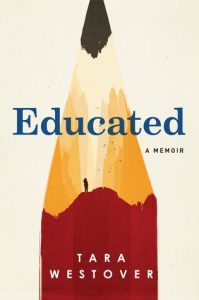 Educated: A Memoir by Tara Westover
Educated: A Memoir by Tara Westover
4 stars, Jun 22, 2018
Okay, there’s a lot to unpack here. Without a doubt, Westover has a captivating life story and is a compelling storyteller. Those two traits combine to make this memoir a force in the field of Mormon literature. From the moment her memoir opened with the phrase “This is not about Mormonism. Neither is it about any other form of religious belief. In it, there are many types of people, some believers, some not; some kind, some not. The author disputes any correlation, positive or negative, between the two” I knew this would be a book that fell perfectly within my literary interests. After the opening chapters covered the Ruby Ridge standoff, I knew it would be gripping. (I met one of the main negotiators from that incident in Sandy Valley, NV.)
I’m still feeling a bit of dissonance regarding this book. Some details don’t seem to blend well with the overall picture Westover has painted of her family (the steady integration of modern technologies, the funds for supporting their daughter at college, being “off the grid” while living in northern Cache Valley). But all those qualms try to discredit Westover as she tells her own story. In a small way, focusing on these details contributes to the abusive gaslighting Westover experienced.
Believe me, I still have plenty of qualms. I’m certain that there was some embellishment in parts, (like her rapid ascent through academia to its highest heights even though she only ran her fingers over the pages of a math book growing up) but these details aren’t critical to the overarching theme. Westover’s memoir comes during a critical time in our culture’s reckoning with the emergence of the #MeToo movement. While Westover did not experience sexual abuse like so many others, she was constantly belittled and disregarded. It infuriates me that her family would base their entire life and livelihood around any rumor regarding the end of the world, yet needed “hard-proof” that one of the older brothers constantly abused each of the younger siblings.
To be certain, Westover wrote this memoir for a wide audience. She only hinted at her departure from her faith. Perhaps I took the introductory remarks cynically and looked at some of her journey as a departure from the religion. To her credit, Westover kept the memoir focused on her path to education through abuse.
However, this story is still unfolding. Occasionally mentions of technology or world news hinted at the recency of the events. Perhaps Westover should have left this one in the oven a bit longer because I almost feel as though this memoir was “weaponized”—that it was largely motivated by the family’s turmoil in an attempt to demonize her estranged parents. This in no way discredits her experiences, but I was left feeling a bit sullied after being dragged into such intimate and unfolding family drama. She may have changed some characters names, but there’s still plenty of identifying information throughout the book that allows for a perfunctory search to yield results to every member of her family.
But regardless, while I didn’t love this memoir, I’m sure I will continue to think about it regularly. It seems like the perfect book club book because there are so many talking points and questions.
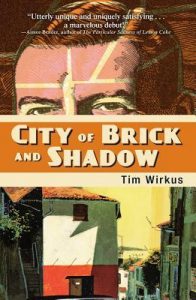 City of Brick and Shadow, by Tim Wirkus
City of Brick and Shadow, by Tim Wirkus
3 stars, Mar 11, 2018
Probably one of my favorite mission related fiction novels. Wirkus does a great job showing missionary life without needless over explanation. The plot itself focuses less on missionary work itself and instead just uses the missionaries as the central characters. Overall the setting was very well done. Wirkus did an amazing job portraying Villa Barbosa as a magical yet profoundly foreign place. The characters seemed a little flat, both Elder Schwartz and Elder Toronto were fairly two-dimensional, and the various peripheral characters only served a solitary purpose for pushing the plot along. But in general this was another good stitch in the grand quilt of Mormon fictional literature.
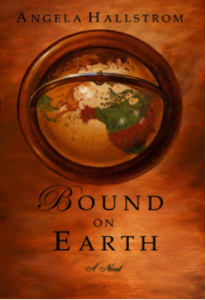 Bound on Earth, by Angela Hallstrom
Bound on Earth, by Angela Hallstrom
3 stars, Jan 06, 2018
A great little collection of vignettes detailing more or less a typical Mormon family. I felt the characters were relatable and life-like, however some of the dialogue dragged, and other times the writing fell a bit flat. Even still, I enjoyed watching the Palmer family struggle and grow through the years with multiple viewpoint characters. It started off very strong with the first story, but then lost itself a touch in the middle. Nonetheless, I feel like the final few stories brought it all back together and provided an adequate ending.
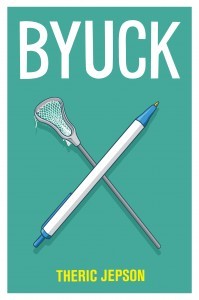 Byuck,by Theric Jepson
Byuck,by Theric Jepson
5 stars, Nov 09, 2017
Guys. I really liked this one. I loved the characters, quirky yet deep. I enjoyed Jepson’s wandering style. Yes, it was predictable, but he let the characters arrive at the end in their own appointed time. Jepson writes about BYU culture from the beautiful perspective of having lived it. Now, BYU has changed since 2001, but many of the same challenges and peculiarities continue today. It seems to be the perfect novel summarizing my view of BYU during the early aughts. Overall, very lovely, humorous, and on point.
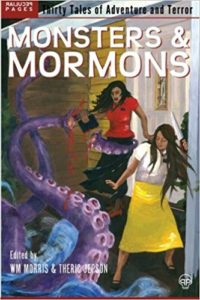 Monsters and Mormons, edited by Wm Morris and Theric Jepson
Monsters and Mormons, edited by Wm Morris and Theric Jepson
4 stars, Oct 24, 2017
I really enjoyed this anthology, it was a great seasonal read for October. Obviously, some stories are stronger than others, but my favorites included: Fangs of the Dragon, Brothers in Arms, Bokev Momen, Experimenting With Life at Extraordinary Depths, Allow Me to Introduce Myself, and The Mountain of the Lord. Each short story took a unique approach to Mormon characters within fantasy or science fiction novels. In some the doctrine of the Church was a strong theme, others relied on the culture surrounding the Church, and yet others had only mentions of the Church that made it “Mormon” literature. Overall great insight to my search for the “Mormon literary voice”.
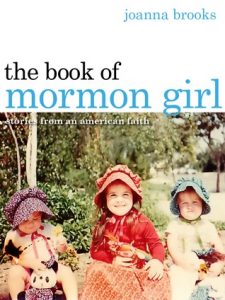 The Book of Mormon Girl, by Joanna Brooks
The Book of Mormon Girl, by Joanna Brooks
3 stars, Sep 25, 2017
Brooks tries to encapsulate the Mormon experience in this memoir. Brooks seemed to perfectly describe so much of my own childhood in a family of staunch believers surrounded by peers not of my faith. I also distinctly remember being the only player on my baseball team getting a Sprite instead of the typical Coca-Cola (sidenote, the day I started this book BYU began selling caffeinated sodas on campus.) Brooks and I share similar experiences standing in awe of multi stake activities, realizing that I wasn’t alone on my path of discipleship. And just as Brooks described I felt destined for BYU and hungrily embraced my new life there filled with members of my faith from all backgrounds. However, for better or for worse I can’t relate to her crisis of faith. While I can intellectually understand the pressures and shock she experienced, that’s where her memoir ceased being my memoir.
This book seems eerily similar to The New York Regional Mormon Singles Halloween Dance:
-
- Young Mormon girl ✓
- Crisis of faith ✓
- Benevolently looks down on believing members ✓
- Focuses on her heritage as opposed to the doctrine ✓
- Leaves church ✓(although Brooks returns to the LDS church whereas Baker distances herself even more)
I didn’t really enjoy The New York Regional Mormon Singles Halloween Dance (man that’s a mouth full…) but The Book of Mormon Girl was certainly better. Brooks strikes me as an honest seeker and doer of truth. While I didn’t necessarily support some of her ideals, I can respect her sincere desires to fight for her beliefs. Anyways, I’m planning on discussing this book with my Psychology of Gender professor next week, so I might update this review after that meeting.
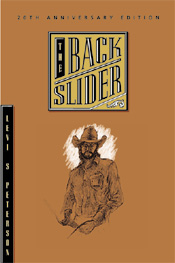 The Backslider, by Levi Peterson
The Backslider, by Levi Peterson
4 stars, Sep 21, 2017
I’m conflicted with my rating of this one. It portrays a very different culture surrounding Mormonism than I grew up with in Missouri. It seems to portray a “wilder” time in our cultural history. One that Hugh Nibley would describe as “zeal without knowledge”. Many good hearted characters showed their lack of doctrinal understanding by their actions and comments. The main themes of guilt and faith and male sexuality were approached with a realistic view, but that meant that there were some vulgar scenes that I skipped over. The questionable content shouldn’t come as a suprise; after all, the entire story revolves around how Frank’s moral compass doesn’t always point north. I feel that it’s a wonderful depiction of a “gardener style” writing. Peterson’s characters are strong and act true to their beliefs while still undergoing development, however the ending seemed abrupt. And the final vision seemed a tad disrespectful, but taught a poignant principle—one that seems more common in member’s views today. Overall, I’m not sure who I would recommend it too. Non-Mormons are likely to misunderstand the cultural significance of this book, yet many members may find it crass. Nonetheless, I still find it faith promoting.
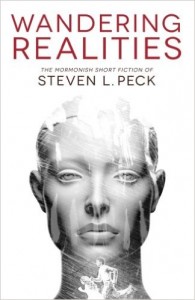 Wandering Realities: Mormonish Short Fiction by Steven L. Peck
Wandering Realities: Mormonish Short Fiction by Steven L. Peck
3 stars, Mar 30, 2016
Overall an enjoyable collection of short stories. Some hit the mark, a lot missed it. My favorites included “Avek, Who is Distributed”, “Two-Dog Dose”, and “The Best Pinewood Derby”. What I really appreciated about the book lies in the title: Mormon-ish short fiction. That little -ish is critical to understanding Peck’s short stories. Most Mormon literature seems to fall into the feel-good and predictable realm—either too preachy or too culture specific. I feel like Peck was able to dip into the wonders of Mormon culture and create something accessible. The characters are all Mormon, and their religion certainly lies at the heart of their decisions, but it isn’t essential that the reader shares all their beliefs. Some stories are quite ridiculous (but fun in a quirky way), others are a strange mix of LDS culture with science fiction, but my favorites were probably the more serious ones. At any rate, I feel like LDS culture is starting to find its voice, and Steven Peck is at the heart of it.
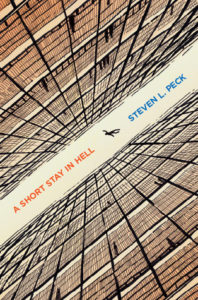 A Short Stay in Hell, by Steven L. Peck
A Short Stay in Hell, by Steven L. Peck
5 stars, Feb 11, 2016
Quite a delightful little book. Although Peck borrows the main engine of his story from Jorge Luis Borges—a library filled containing with all combinations of letters and symbols—I feel like he made it his own. Peck didn’t pick any given religion mentioned in the book to criticize but rather as a thought experiment. What if the only true religion is ancient and now extinct? What if we are all doomed to hell—albeit a temporary and not eternal hell. How long is eternity? Can a finite number be so large it melts into eternity? These are all questions that Peck raised as Soren sorts through his new existence.
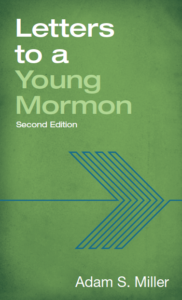 Letters to a Young Mormon, by Adam S. Miller
Letters to a Young Mormon, by Adam S. Miller
5 stars, Feb 13, 2016
Brilliant. Miller sees things from a wiser perspective and explains it clearly. This isn’t a gimmick, his advice seems tried and tested. And a lot of the writing isn’t necessarily do and don’t type advice anyway, just explanation and clarification. He doesn’t stray into the anecdotal stories but he quietly and simply states his views. The title suggests that it’s exclusively for teenagers, but I felt that it applies to everyone in whatever stage of life. It transcends age gaps and age boundaries. So much of the writing is quotable, some of my favorites include:
“Being a good person doesn’t mean you’re not a sinner. Sin goes deep. Being good will save you a lot of trouble, but it won’t solve the problem of sin.”
“Read Paul out loud like poetry. Copy the Book of Mormon by hand. Read the bible backwards once verse at a time. Tally their letters like numbers. Squeeze their verses like oranges.”
“People have big ideas about what the kingdom of God is supposed to be like, but teeny tiny mustard seeds like Jesus described don’t grow into towering cedars. Generally, they don’t amount to much more than overgrown bushes.”
I recently bought my own copy, and I’m taking copious notes. Some sections can’t necessarily withstand intense scrutiny—especially examining Miller’s working definitions of terms. But overall I highly recommend it. And I think even non-Mormons will find it to their liking.
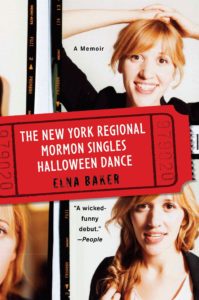 The New York Regional Mormon Singles Halloween Dance, by Elna Baker
The New York Regional Mormon Singles Halloween Dance, by Elna Baker
1 star, Sep 25, 2015
So I heard about this book because the author is a contributor to This American Life. I desperately wanted to enjoy it. First the good: Baker has a very readable voice. I finished the book far faster than I should have for being in the middle of an academic semester. Now the problems… The main plot centralizes on Baker deciding between her faith and the world. As a member of the Church of Jesus Christ of Latter-day Saints myself I know exactly what the church expects of its members. Baker tried to paint herself as this righteous Mormon with deep beliefs and desires to follow the teachings of her faith, yet her actions reflect the opposite. Frankly she struck me as self-righteous while still stubbornly insisting on not keeping the commandments. I’ve heard that Baker now introduces herself as an ex-Mormon, let me tell ya after reading her memoir, I’m not terribly surprised. She seemed to embrace the LDS church for selfish and narcissistic reasons. However Baker leaving the church is not the reason I disliked her memoir (I love Richard Dutchner’s work in film.) She just constantly lies to herself with what she truly wants and what she truly believes.
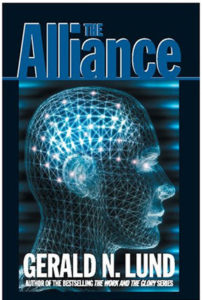 The Alliance, by Gerald N. Lund
The Alliance, by Gerald N. Lund
3 stars, Jun 03, 2015
Our one successful office book club book! (The club unofficially ended when I was the only person to finish the book. You’d think library workers would read a lot more, but alas we’re in college…) I know Lund from his work in the Work & the Glory series (I’ve never read them, but they looked imposing on my aunt’s bookshelf.) Unfortunately I’m very late on this review, so I can’t remember my exact reasons for the 3 stars. The plot dipped into the predictable at times, but I liked the subtle undertone of agency. Lund is an active member of the Church of Jesus Christ of Latter-day Saints (Mormons) and so am I. This is not in any way a “Mormon” book. Although the characters generally believe in God, they profess no specific religion. However agency is a critical tenant to LDS doctrine—that we have control over our own actions. In fact Latter-day Saints believe that before we were born Satan tried to take that freedom of choice away from us by forcing everybody to always choose the right. Our Father in Heaven rejected Satan’s plan in favor of us making mistakes but learning and progressing. Satan got a little bitter about i and ended up being cast out of heaven and thus embraced his role as the devil. Lund’s characters face a similar dilemma. Which do we favor more, safety or freedom? Anyways I wasn’t planning on explaining doctrine, but overall I liked how Lund handled the issue of free choice vs. security.
Featured photo by: Kinga Cichewicz

.
Since two of these books are mine, I don’t want to leave a detailed comment, but thank you for the thoughtful reviews. This is a solid and varied collection.